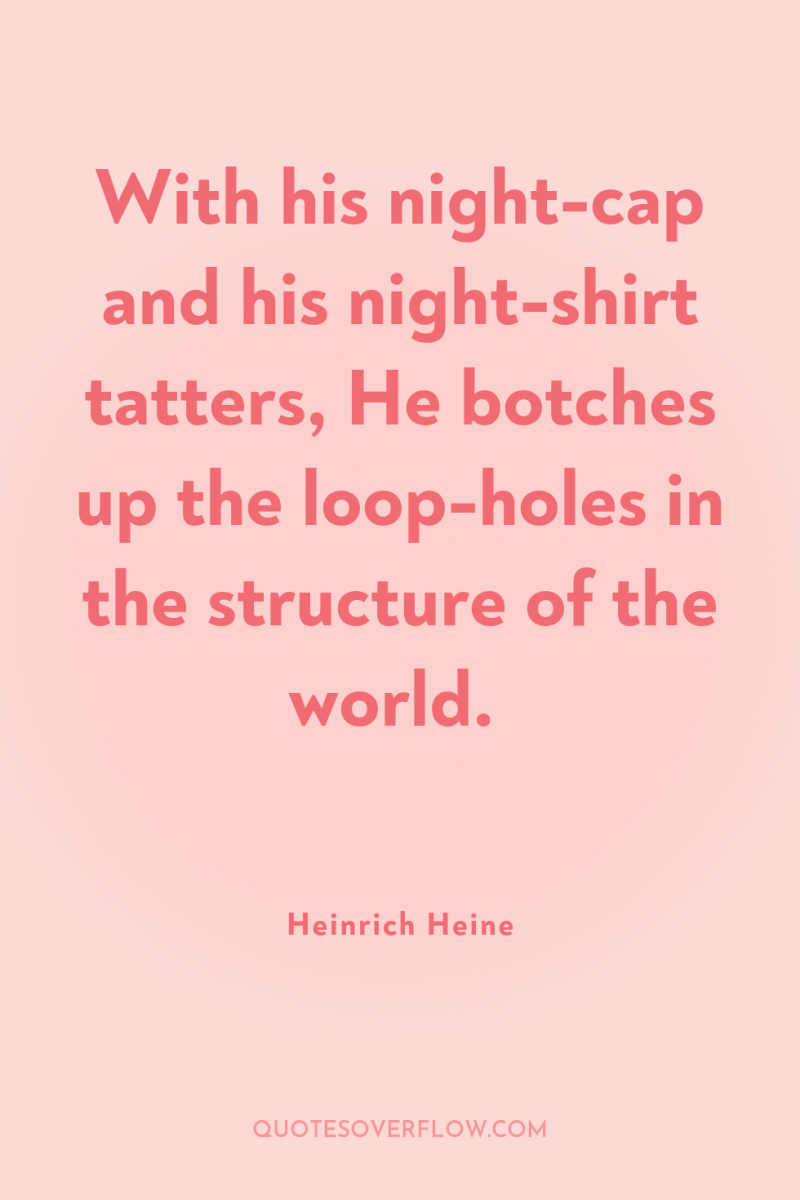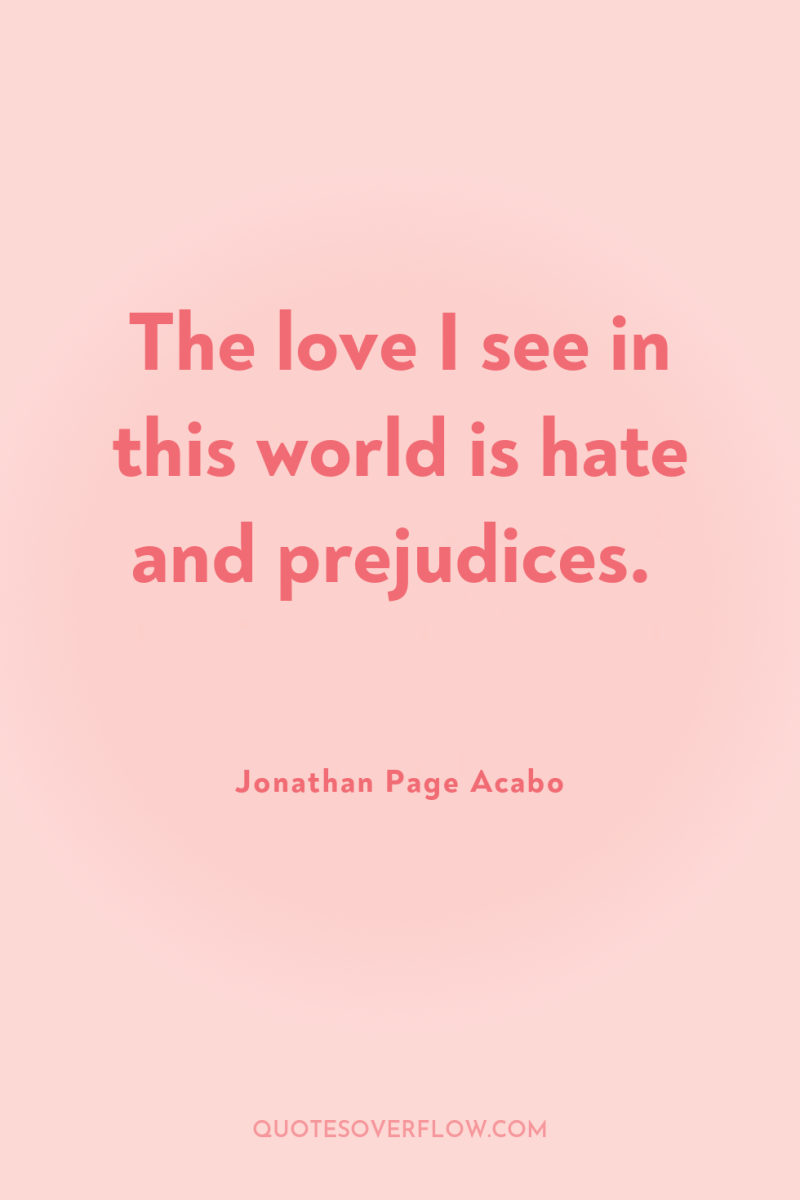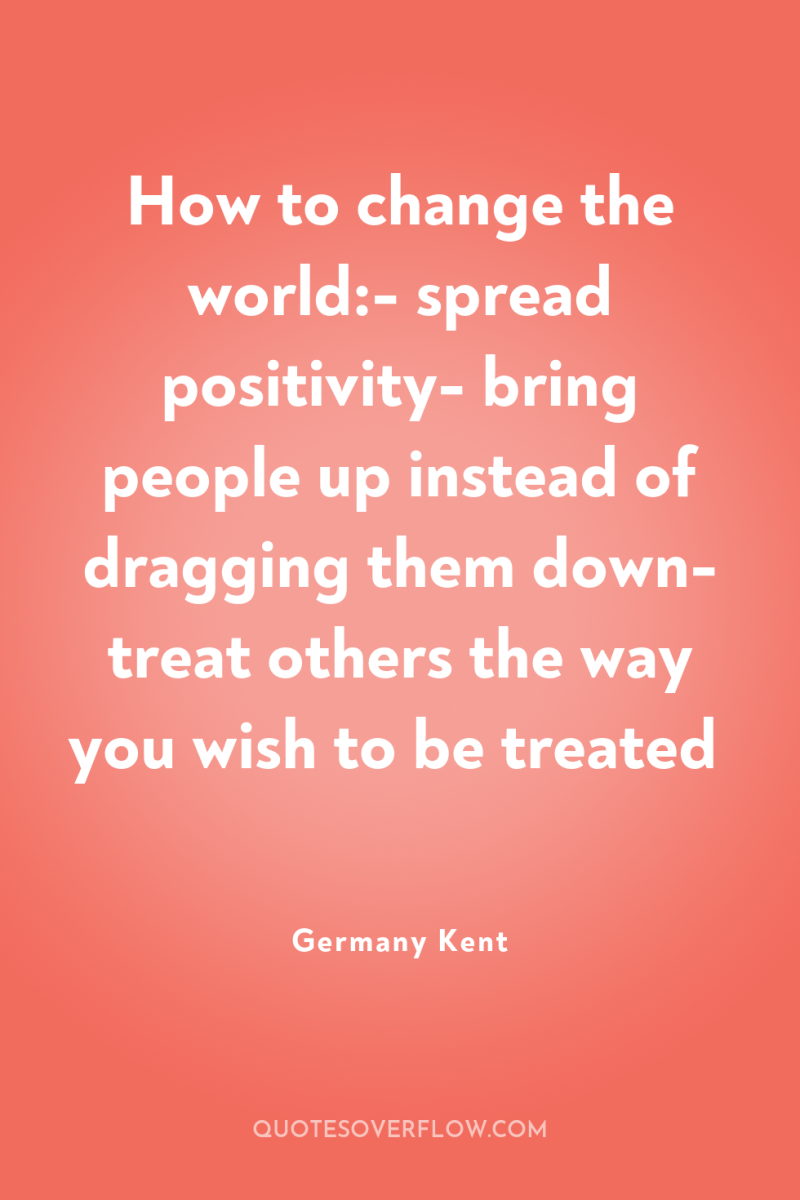
1
With his night-cap and his night-shirt tatters, He botches up the loop-holes in the structure of the world.Heinrich Heine
2
Reach out and help others. If you have the power to make someone happy, do it. Be a vessel, be the change, be the difference, or be the inspiration. Shine your light as an example. The world needs more of that.Germany Kent
3
The average Bhutanese knows much more about the world than the average American...(for Americans)It is more comfortable to watch fake news about celebrities than to know what's happening in China or southern Sudan. But events happening in China or Sudan affect us so much more because they are real.Linda Leaming
4
Two things I try to remember: My cultural, social, and financial environments formulate my view of the world. My age, sex, race, where I was born, who raised me, and who my inner circle is formulate my view of the world. My education, my exposure to new and different things, or lack thereof, formulate my view of the world. My view of the world formulates my opinions. But, if there's a missing piece from my world view, I can't have an informed, intelligent opinion on it. So, for example, if I've never experienced the color purple, my only informed opinions can be on the other colors. Not purple. I can say, "I don't like purple, " or "I like purple, " but in either case, my opinion has no significance. The second thing I try to remember is that just because someone has a different opinion than I do, and he tells me so, it doesn't mean I'm being persecuted. In actual fact, it might mean that I'm about to learn something big. .Patricia V. Davis

5
The love I see in this world is hate and prejudices.Jonathan Page Acabo

6
How to change the world:- spread positivity- bring people up instead of dragging them down- treat others the way you wish to be treatedGermany Kent
7
A quiet mind is the quickest and biggest step to a peaceful world.Rasheed Ogunlaru
8
Funny how we do not realize the true value and legacy of a living icon until they suddenly pass away. Truth is, there are many living legends among us, we just do not stop and take time to notice their worth until it's too late.Germany Kent
9
It is obvious that the prevalent Christian world-view is not a Kingdom world-viewSunday Adelaja
10
Our world-view determines the manner in which we engage the world.Sunday Adelaja
11
Let's be honest, the world's always been a scary place with very little charm." I try to brush it off as I've brushed off the flu, as I brushed off the death of my father when I was young, as I've brushed off so much since Benton has known me.Patricia Cornwell
12
The fiction writer is an observer, first, last, and always, but he cannot be an adequate observer unless he is free from uncertainty about what he sees. Those who have no absolute values cannot let the relative remain merely relative; they are always raising it to the level of the absolute. The Catholic fiction writer is entirely free to observe. He feels no call to take on the duties of God or to create a new universe. He feels perfectly free to look at the one we already have and to show exactly what he sees.Flannery OConnor
13
Because despite the undeniable knowledge that I wasn't human–or mostly human, anyway–despite the proof the computer screen had show in the repair room, I still picture my interior just the same as any other sixteen-year-old girl's. Blood and guts and bones. A brain, and a functioning heart. Hopes and dreams, fears and sorrow. They could tell me the truth, but they couldn't force me to accept it.Debra Driza
14
Best way to clear the air is to have it all out in the open.Harper Lee
15
This vacillation between assertion and denial in discussions about organised abuse can be understood as functional, in that it serves to contain the traumatic kernel at the heart of allegations of organised abuse. In his influential ‘just world’ theory, Lerner (1980) argued that emotional wellbeing is predicated on the assumption that the world is an orderly, predictable and just place in which people get what they deserve. Whilst such assumptions are objectively false, Lerner argued that individuals have considerable investment in maintaining them since they are conducive to feelings of self–efficacy and trust in others. When they encounter evidence contradicting the view that the world is just, individuals are motivated to defend this belief either by helping the victim (and thus restoring a sense of justice) or by persuading themselves that no injustice has occurred. Lerner (1980) focused on the ways in which the ‘just world’ fallacy motivates victim-blaming, but there are other defences available to bystanders who seek to dispel troubling knowledge. Organised abuse highlights the severity of sexual violence in the lives of some children and the desire of some adults to inflict considerable, and sometimes irreversible, harm upon the powerless. Such knowledge is so toxic to common presumptions about the orderly nature of society, and the generally benevolent motivations of others, that it seems as though a defensive scaffold of disbelief, minimisation and scorn has been erected to inhibit a full understanding of organised abuse. Despite these efforts, there has been a recent resurgence of interest in organised abuse and particularly ritualistic abuse (eg Sachs and Galton 2008, Epstein et al. 2011, Miller 2012).Michael Salter
16
Some readers may find it a curious or even unscientific endeavour to craft a criminological model of organised abuse based on the testimony of survivors. One of the standard objections to qualitative research is that participants may lie or fantasise in interview, it has been suggested that adults who report severe child sexual abuse are particularly prone to such confabulation. Whilst all forms of research, whether qualitative or quantitative, may be impacted upon by memory error or false reporting. there is no evidence that qualitative research is particularly vulnerable to this, nor is there any evidence that a fantasy– or lie–prone individual would be particularly likely to volunteer for research into child sexual abuse. Research has consistently found that child abuse histories, including severe and sadistic abuse, are accurate and can be corroborated (Ross 2009, Otnow et al. 1997, Chu et al. 1999). Survivors of child abuse may struggle with amnesia and other forms of memory disturbance but the notion that they are particularly prone to suggestion and confabulation has yet to find a scientific basis. It is interesting to note that questions about the veracity of eyewitness evidence appear to be asked far more frequently in relation to sexual abuse and rape than in relation to other crimes. The research on which this book is based has been conducted with an ethical commitment to taking the lives and voices of survivors of organised abuse seriously. .Michael Salter
17
My world view is somewhat unique. I have learned from many great philosophers including Plato, Socrates, Buddha, Jesus, Darwin, Tagore, Emerson, and many more.Debasish Mridha
18
In any case, you can't have effective allegory in times when people are swept this way and that by momentary convictions, because everyone will read it differently. You can't indicate moral values when morality changes with what is being done, because there is no accepted basis of judgment. And you cannot show the operation of grace when grace is cut off from nature or when the very possibility of grace is denied, because no one will have the least idea of what you are about.Flannery OConnor
19
Since the war, we're the only intelligent species left in the universe, therefore we think everything in this universe has to conform to our paradigm of what makes sense. Do you have any idea how arrogant that view is and on how little of this universe we base it?Robert Buettner
20
Ask no guarantees, ask for no security, there never was such an animal. And if there were, it would be related to the great sloth which hangs upside down in a tree all day, every day, sleeping its life away.Ray Bradbury
21
Daisuke was of course equipped with conversation that, even if they went further, would allow him to retreat as if nothing had happened. He had always wondered at the conversations recorded in Western novels, for to him they were too bald, too self indulgent, and moreover, too unsubtly rich. However they read in the original, he thought they reflected a taste that could not be translated into Japanese. Therefore, he had not the slightest intention of using imported phrases to develop his relationship with Michiyo. Between the two of them at least, ordinary words sufficed perfectly well. But the danger was of slipping from point A to point B without realizing it. Daisuke managed to stand his ground only by a hair's breadth. When he left, Michiyo saw him to the entranceway and said, "Do come again, please? It's so lonely.Unknown
22
Generally the rational brain can override the emotional brain, as long as our fears don’t hijack us. (For example, your fear at being flagged down by the police can turn instantly to gratitude when the cop warns you that there’s an accident ahead.) But the moment we feel trapped, enraged, or rejected, we are vulnerable to activating old maps and to follow their directions. Change begins when we learn to "own" our emotional brains. That means learning to observe and tolerate the heartbreaking and gut-wrenching sensations that register misery and humiliation. Only after learning to bear what is going on inside can we start to befriend, rather than obliterate, the emotions that keep our maps fixed and immutable.Unknown
23
You should have noticed by now, sometimes a monster looks just like any other man.Helen Maryles Shankman
24
Worship is the launching pad for life.Rosaria Champagne Butterfield
25
If you carry a weapon, war will follow you. If you carry a smile, love will knock at your door.Amit Ray
26
... But these skeptics are only selectively skeptical. They think themselves enlightened for resisting all this new proof and remaining steadfast in mistrusting anything that someone else says. But it is a false enlightenment to accept only those ideas that align with one's worldview and reject those that don't.Ken Ilgunas
27
As I discussed in the previous chapter, attachment researchers have shown that our earliest caregivers don't only feed us, dress us, and comfort us when we are upset; they shape the way our rapidly growing brain perceives reality. Our interactions with our caregivers convey what is safe and what is dangerous: whom we can count on and who will let us down; what we need to do to get our needs met. This information is embodied in the warp and woof of our brain circuitry and forms the template of how we think of ourselves and the world around us. These inner maps are remarkably stable across time. This doesn‘t mean, however, that our maps can‘t be modified by experience. A deep love relationship, particularly during adolescence, when the brain once again goes through a period of exponential change, truly can transform us. So can the birth of a child, as our babies often teach us how to love. Adults who were abused or neglected as children can still learn the beauty of intimacy and mutual trust or have a deep spiritual experience that opens them to a larger universe. In contrast, previously uncontaminated childhood maps can become so distorted by an adult rape or assault that all roads are rerouted into terror or despair. These responses are not reasonable and therefore cannot be changed simply by reframing irrational beliefs. .Unknown
28
The very fact of being human panics us into the most grotesque play-acting imaginable; and we deal in absurdities to keep life from being a total waste, like one constant jacking-off party.Hal Bennett
29
I do not find theism any more credible than materialism as a comprehensive world view. My interest is in the territory between them.Thomas Nagel
30
Traumatic events challenge an individual's view of the world as a just, safe and predictable place. Traumas that are caused by human behavior.. . commonly have more psychological impact than those caused by nature.American Psychological Association
31
Our work calls on us to confront, with our patients and within ourselves, extraordinary human experiences. This confrontation is profoundly humbling in that at all times these experiences challenge the limits of our humanity and our view of the world...John P. Wilson
32
When what we believe we’ve mastered is no longer predictable we’re not fine. The world suddenly is a very scary place. It loses its charm.Patricia Cornwell